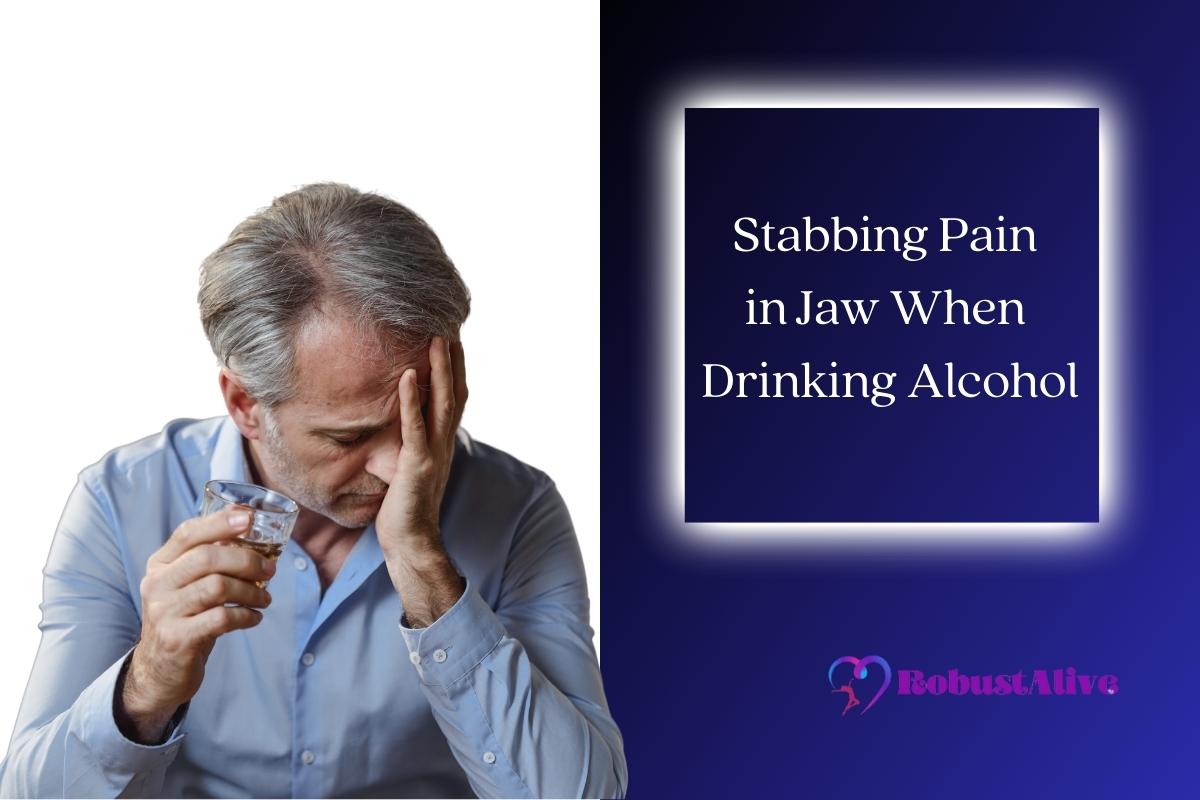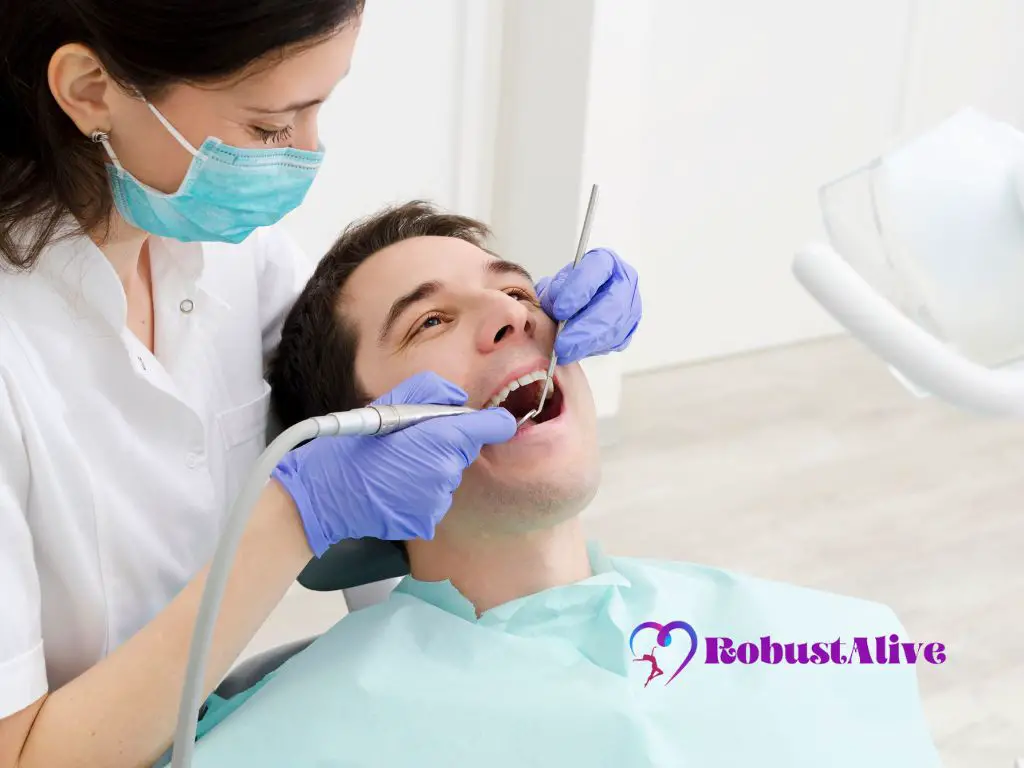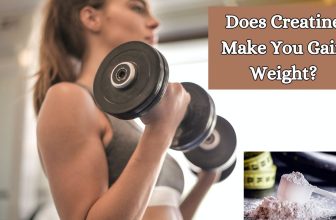Stabbing Pain in Jaw When Drinking Alcohol

If you’ve been experiencing stabbing pain in your jaw whenever you consume alcohol, it’s essential to understand the potential causes behind this discomfort. While drinking alcohol is typically associated with relaxation and enjoyment, experiencing jaw pain can be concerning.
So, what could be causing stabbing pain in jaw when drinking alcohol?
Stabbing pain in the jaw while drinking alcohol can be caused by TMJ disorders, dental problems, allergies, acid reflux, nerve damage, dehydration, or salivary gland issues. To manage the pain, limit alcohol, take OTC pain relievers, apply heat, care for your teeth, adjust your diet, reduce stress, and avoid teeth grinding.
This article will explore possible reasons for stabbing pain in your jaw while drinking alcohol. Also, we will provide insights into potential solutions to alleviate the discomfort. Keep reading!
Can Alcohol Cause Stabbing Pain in Your Jaw?
While alcohol itself may not directly cause stabbing pain in the jaw, there are factors related to alcohol consumption that can contribute to jaw discomfort. The composition of alcohol, including its various elements and corrosive pH, along with the fermentation process that introduces trace impurities, can impact the body.
When we consume food and beverages, including alcohol, our body naturally produces excessive saliva as part of the digestion process. A study found that consuming a liquid containing tartaric acid, tannin, ethanol, and added sucrose significantly increased salivation in individuals.
This research suggests that specific components in beverages, such as tannin-rich red wines or sour flavors, can stimulate the parotid gland, potentially leading to jaw pain.
However, it’s important to note that individual reactions can vary, and not everyone will experience jaw pain after consuming alcohol.
What are The Common Causes Of Stabbing Pain in Jaws When Drinking Alcohol?
The stabbing pain in the jaw when consuming alcohol can range from a brief, sharp sensation to persistent discomfort. It is crucial to differentiate between temporary discomfort caused by the nature of alcohol and the possibility of an underlying medical condition.
Here are some common causes of stabbing pain in your jaw when drinking alcohol:
- Temporomandibular Joint Disorders (TMJ)
- Dental issues
- Allergic reactions
- Acid reflux
- Neural factors
- Dehydration
- Salivary gland issues
1. Temporomandibular Joint Disorders (TMJ)
Temporomandibular joint disorders (TMJ disorders) refer to a group of conditions that affect the temporomandibular joints, ligaments, and muscles associated with the jaw. These joints are located on each side of the head, just in front of the ears, allowing for the jaw’s opening, closing, and movement.
Regular alcohol consumption has been linked to the worsening of TMJ symptoms, which includes:
- jaw pain
- headaches
- facial pain
- earaches
The repetitive motion of drinking or clenching the jaw while consuming alcohol can strain the TMJ and worsen the symptoms.
2. Dental Issues

Graphics Credit: Robustalive.com
Alcohol consumption can contribute to dental problems such as tooth decay, gum disease, and infections. The corrosive nature of alcohol and its impact on the balance of bacteria in the mouth can lead to cavities and oral infections.
When dental problems become severe, they can cause jaw pain, mainly when pressure is applied during drinking.
3. Allergic Reactions
Although rare, some individuals may experience an allergic reaction to alcohol. This can manifest as a variety of symptoms which includes:
- hives
- itching in the mouth, eyes, or nose
- difficulty in breathing
- facial swelling
- jaw pain
If you suspect an allergic reaction, seek immediate medical attention.
4. Acid Reflux
Acid reflux, also known as gastroesophageal reflux disease (GERD), occurs when stomach acids flow back into the esophagus, irritating. This condition can lead to heartburn, chest pain, and a sensation of stabbing pain in the jaw and throat when consuming alcohol.
5. Neural Factors
Excessive alcohol consumption can result in alcoholic neuropathy. It is a condition in which nerve tissue is damaged due to alcohol’s impact on essential vitamins and minerals required for proper nerve function. The jaw pain experienced may result from nerve damage caused by alcohol.
6. Dehydration
Alcohol is a diuretic, which promotes fluid loss from the body, leading to dehydration. Dehydration can cause muscle cramps, including in the jaw muscles, resulting in pain. It is essential to stay hydrated while consuming alcohol to minimize the risk of dehydration-related symptoms.
7. Salivary Gland Issues
While alcohol does not directly cause salivary gland problems, dehydration from alcohol consumption can contribute to the formation of salivary stones. These hardened mineral deposits can obstruct salivary ducts, leading to pain in the jaw, particularly after eating or while anticipating a meal.
How to Get Rid of Stabbing Pain in Jaw When Drinking Alcohol?
If you experience a stabbing pain in your jaw while drinking alcohol, there are several strategies you can try to manage and relieve the symptoms:
- Limit your alcohol consumption: The first step is to reduce or stop drinking alcohol altogether. This will allow you to observe whether the pain subsides or persists even without alcohol.
- Take over-the-counter pain relievers: Nonsteroidal anti-inflammatory drugs (NSAIDs) like ibuprofen or acetaminophen can temporarily relieve jaw pain. However, it’s essential to consult with a healthcare professional before taking any medication, especially if you have pre-existing medical conditions or take other medications.
- Apply heat to the affected area: Warm compresses or hot water bottles on your jaw can help relax the muscles and reduce pain. Just make sure not to use excessive heat that could cause burns.
- Maintain good oral hygiene and dental care: Regular brushing, flossing, and using mouthwash are essential for preventing dental problems contributing to jaw pain. Visiting a dentist for a thorough examination, cleaning, and any necessary treatment is recommended. They can address underlying dental issues and guide oral care.
- Adjust your diet: Some individuals relieve jaw pain by eating softer foods requiring less jaw movement. Avoiding hard or chewy foods, alcohol, and acidic beverages can minimize discomfort while eating and drinking.
- Reduce stress and try relaxation techniques: Stress and anxiety can worsen jaw pain and temporomandibular joint (TMJ) disorders. Stress-reducing activities like mindfulness, deep breathing exercises, and meditation can help relax the jaw muscles and alleviate pain. Additionally, avoiding habits like teeth grinding and clenching can reduce strain on the jaw.
Taking care of your oral health, managing stress, and making lifestyle modifications can contribute to improved jaw health. Remember to listen to your body and practice self-care.
When Should You Consult A Doctor?
If the stabbing pain in your jaw continues or worsens even after making lifestyle changes, scheduling an appointment with a doctor is crucial. This is especially important because jaw pain could indicate an allergic reaction to alcohol, and seeking prompt medical attention is necessary.
A doctor will examine you, go through your medical history, and conduct any required tests to identify the root cause of the pain and provide appropriate treatment to prevent any potential complications.
Frequently Asked Questions (FAQs)
-
Why Do My Neck And Jaw Hurt After Drinking Alcohol?
Neck and jaw pain after drinking alcohol may result from swollen cervical lymph nodes due to excessive consumption. Frequent pain in these areas can indicate alcoholism, leading to broader health problems.
-
Why Does My Mouth Sting When I Drink Alcohol?
The stinging sensation in your mouth, when you drink alcohol, is caused by the rapid diffusion of ethanol into your saliva, which breaks down into acetaldehyde and triggers the burning sensation in your oral cavity.
-
Why Does My Neck Get Stiff When I Drink Alcohol?
The exact cause of a stiff neck when drinking alcohol can vary, but it may be due to alcohol’s dehydrating effects, which can lead to muscle tension and inflammation in the neck area. Additionally, alcohol can impair coordination and balance, increasing the risk of muscle strain or injury that can result in a stiff neck.
Conclusion
In summary, if you feel a stabbing pain in your jaw when drinking alcohol, there can be different reasons, including temporary discomfort or underlying medical conditions. Determining the exact cause to deal with the symptoms effectively is crucial.
You can try managing the pain by reducing your alcohol intake, taking good oral hygiene, finding ways to manage stress, and seeking professional help if necessary.





